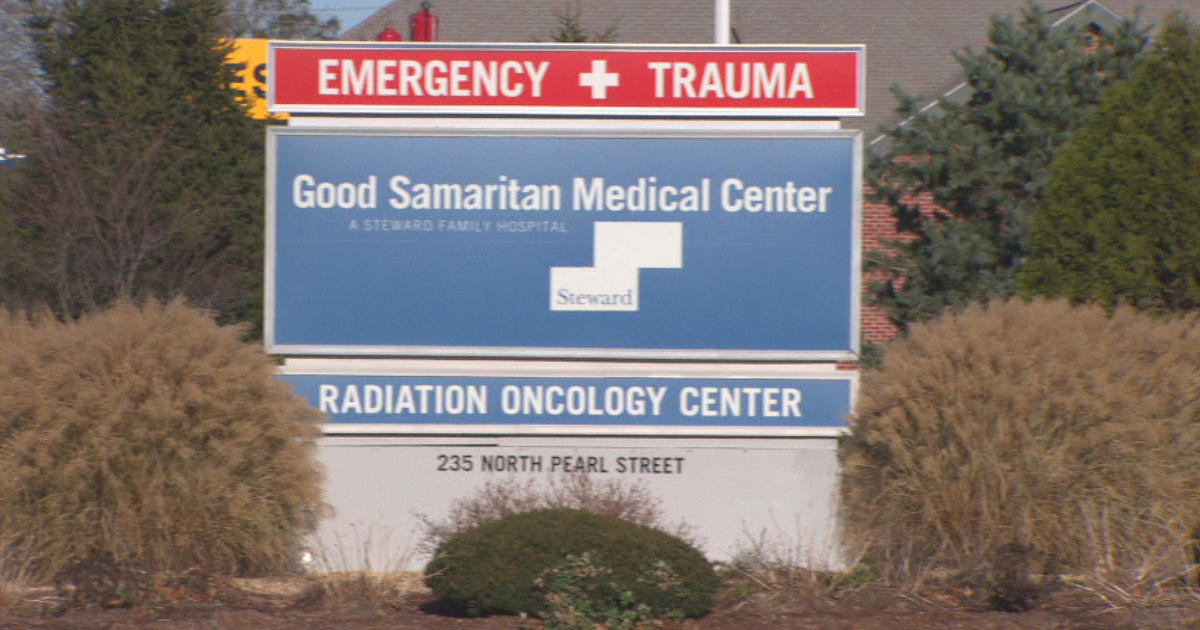Winter 2015-16 Is One For The Books
You may be asking the question 'what winter?' right now, and I wouldn't blame you.
After a brutally cold and snowy winter last go around, this was the exact opposite. And I mean that in almost every sense of the word exact. February 2015 and December 2015 were mirror images of each other. Departures from average were almost exactly the same. Days below freezing/over 50F flipped in a precise manner. Weather is nothing if not balance. Now most of you may say - well isn't that extreme? Something must be wrong if we go from that cold and snowy to that warm and snowless. I'd argue that this is the natural way of things. Nature is constantly fighting to achieve balance. Almost every winter on record which featured big snow and cold was immediately followed by a warm and non-snowy winter. An astute viewer asked on Twitter yesterday 'What happened after that last record-setting winter, 1995-96?' A great question, and the answer was as bland of a winter you can imagine with nearly no snow until the infamous April Fool's Blizzard and the 10th warmest winter on record. After a pummeling of snow in 1993-94 (96.3") we went to 14.9" the following winter. After the infamous 1977-78 season, a collapse back to 27.5" the next winter. Yes, history repeats itself. One extreme is often followed by another.
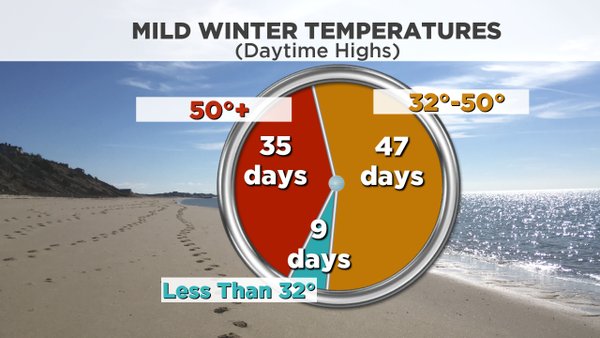
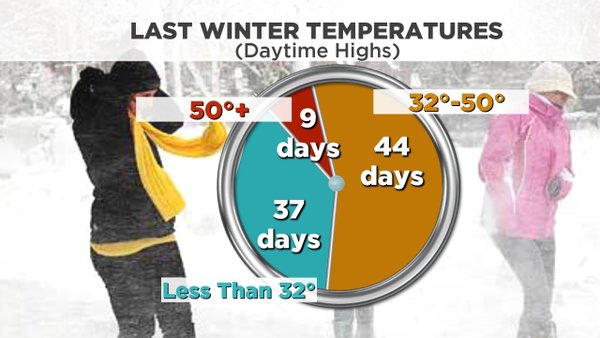
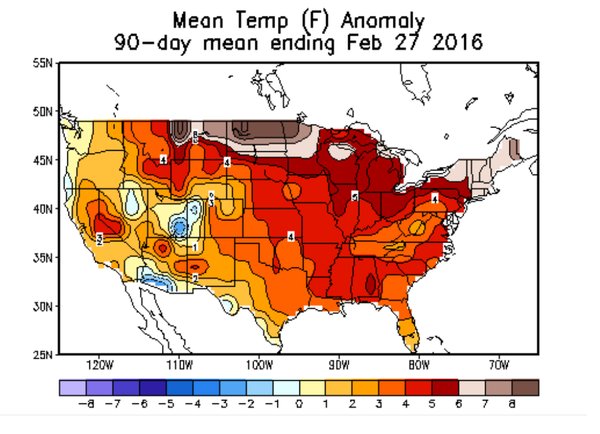
Winter was a very mild one across the U.S., thanks to a strong polar vortex and few arctic intrusions. Pacific air dominated the country, thanks in part to a very strong El Nino. Source: NCDC
I think it's also important to point out that nothing that happened this winter was all that unexpected. During a strong El Nino, you often see warmer temperatures across the northern tier states at the very least. That's what we got. You expect a risk of large mid-Atlantic storms. Hello Blizzard of 2016. You expect an active subtropical jet stream pumping in mild Pacific air - you betcha. And you expect stormy conditions along the West Coast - mhm. The Northwest has been soaked and California, after taking a breather in February, is about to get rocked in March with heavy rain and snow. Don't be surprised when you start hearing about lots of severe weather chances across the south. A lot of times we forget that odd weather patterns can be predicted, at least to some degree. Just because it's weird doesn't make it unpredictable or a complete anomaly.
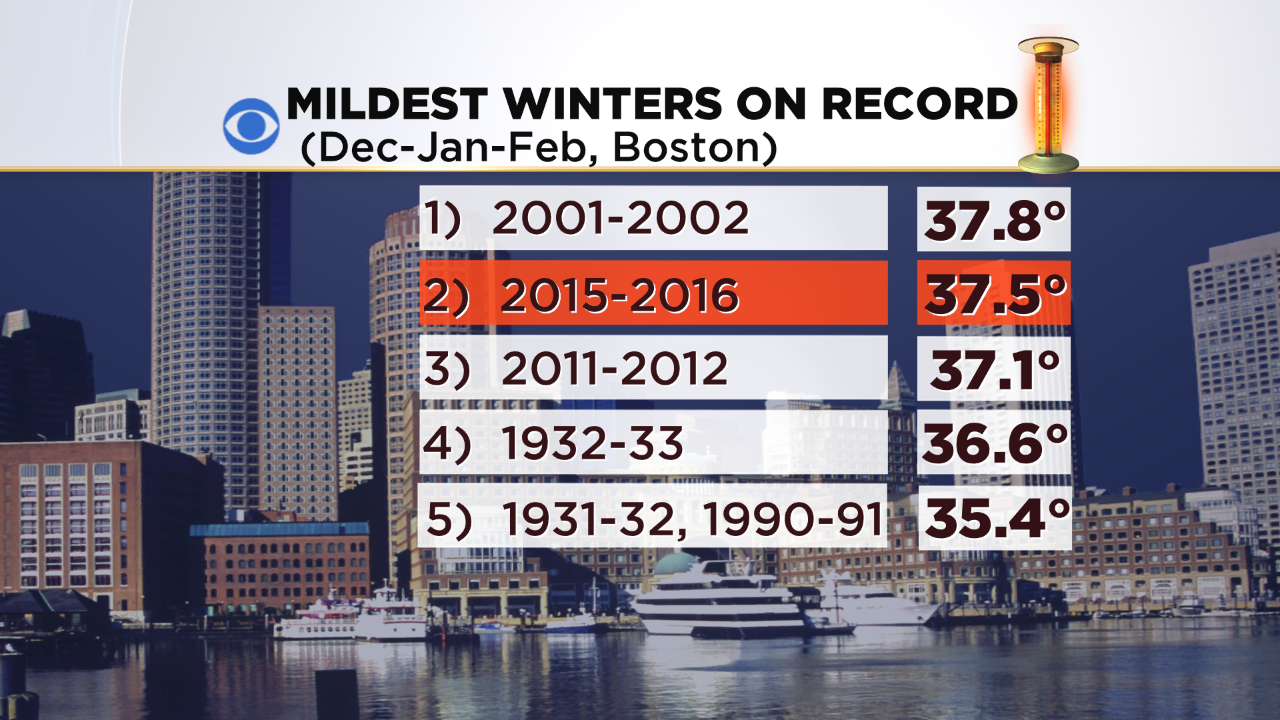
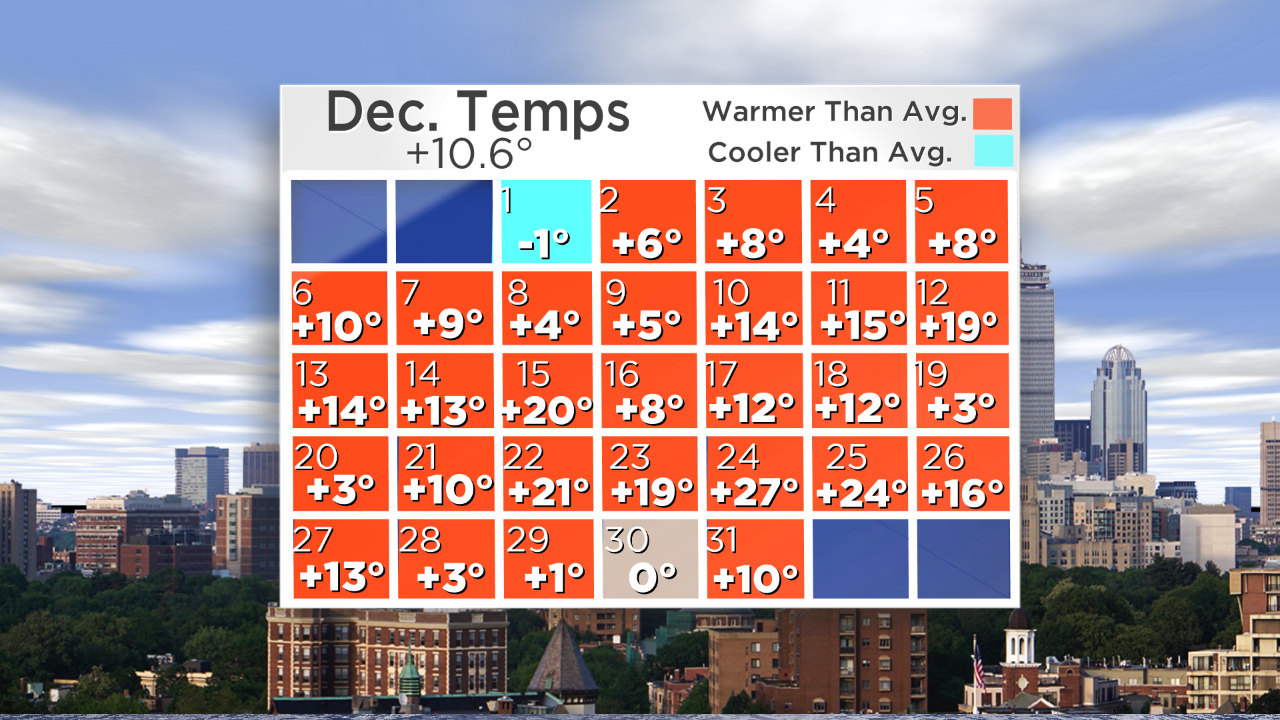
So how weird exactly was this winter?
We finished with the 2nd warmest on record in Boston, just behind the winter of 2001-02. A major part of that was December, which was by far the standout month for exceptional warmth. Both January and February followed up with above average temperatures, combining to make for a snowless landscape as we begin March. It's interesting to see that high up on the warmest winter leaderboard is 1932-33. That following winter, Boston saw its coldest month ever recorded. Will we see another huge swing next winter? Perhaps something to keep tabs on throughout the year - particularly as ENSO flips from El Nino to an expected La Nina.
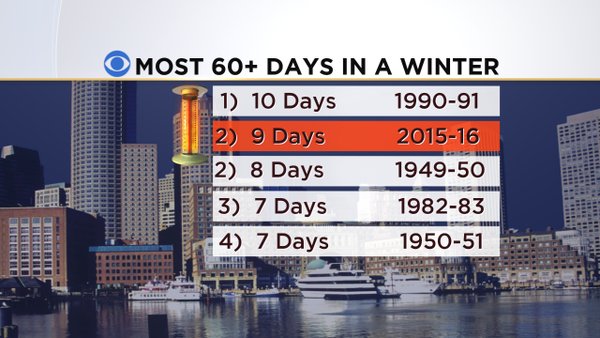
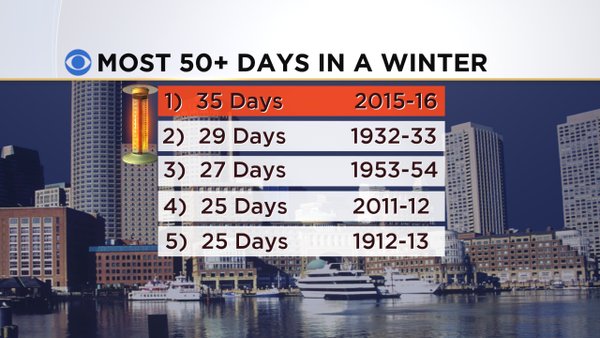
When it comes to 60 degree days, the Leap Year helped us reach 2nd all-time with 9 days reaching 60 degrees or warmer this winter. Four of them came in February, with the remainder in our wildly mild December. When it comes to 50 degree days, the record was shattered. A whopping 35 of them, 20 of which came in December. That's something skiers have been lamenting and Boston Marathon trainers have been cheering. Hard to imagine an easier training season than this one.
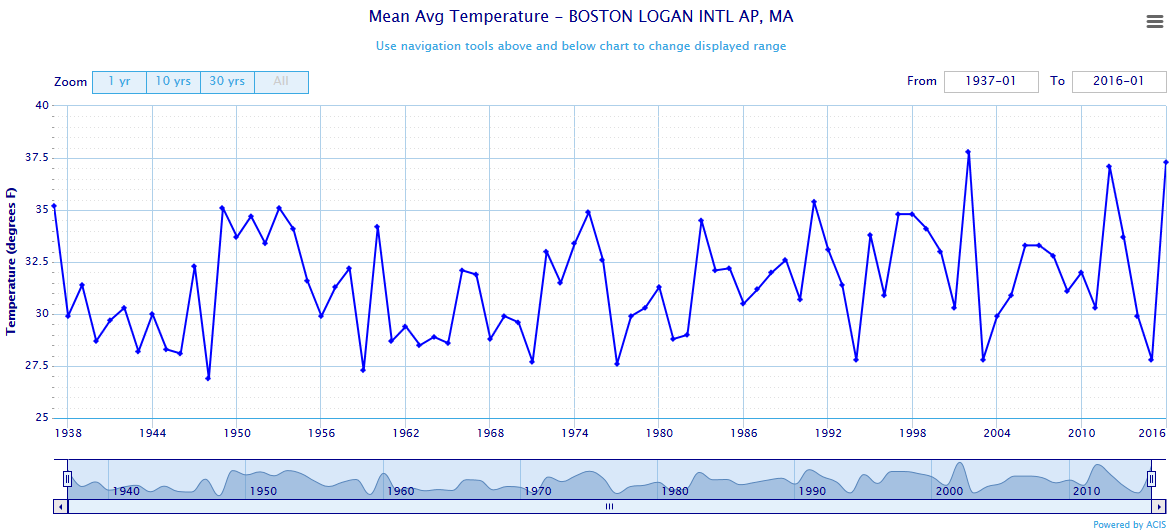
Mean winter temperatures since records moved to Logan Airport in 1936. Source: xmACIS
The knee-jerk reaction to a season like this is to proclaim winter's dead and that they 'just don't make them like they used to.'
Looking back at records since they moved to Logan Airport, you can see that that is not the case. The harshest winters are still visiting us at the same rate as they always have, about once every 10-15 years (the bottom points on the graph above).
What DOES interest me is the volatility in recent decades. It seems as if the swings are becoming more intense, which is something to study and look into more deeply. Are we jumping up and down more often, or is it just a short-term phenomena? That's a difficult element to sort out when figuring out the climate puzzle. Our period of record is so short that squeezing out the signal from the noise isn't always easy. But I think we can say with high certainty that the overall trend has been for rising temperatures over time, even if the harsh cold is still calling at the same rate. And when it comes to snow, we are in a 'golden age' of sorts. It's hard to find a snowier stretch than the past 10 years in southern New England. Is this tied to warming, or perhaps more specifically to warming ocean temperatures? Or is it also rooted in the changing snow-measuring methods instituted in the early 90s? If you look back at snow records, volatility goes up almost exactly when snow-measuring standards were changed. Coincidence or correlation? All things we are studying.
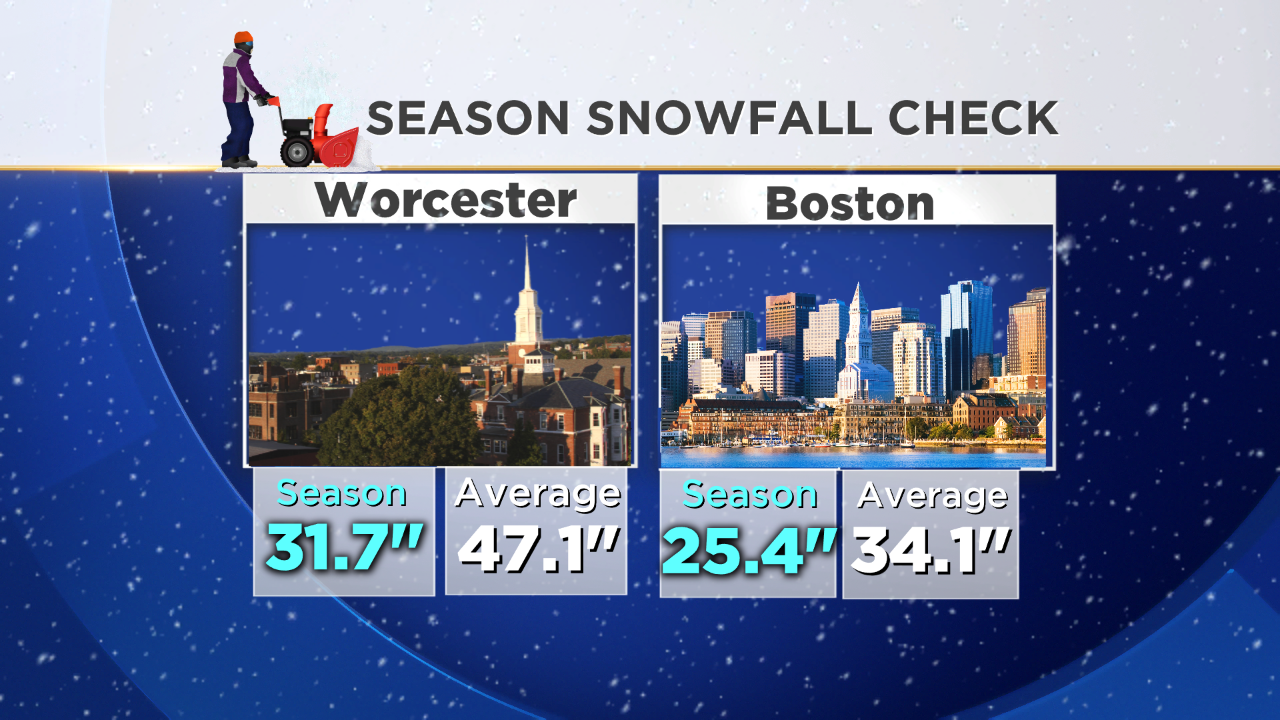
Speaking of snow, the story actually isn't quite as interesting as you would think. Unlike temperatures, snow records are 'seasonal' and technically run July 1st through June 30th. Of course, it's going to be pretty tough to snow in Boston after early April unless there's a gigantic volcanic eruption somewhere. So we're close to calling it, but not all the way there.
Currently, this is where we stand for seasonal snowfall. It's below average as expected, but there are 25 winters with less snow on the books in the Boston area. A winter like this is far more typical than the one we saw last year, that's for sure. And we've been groomed to think we're supposed to get crushed every winter with quite an impressive blitz of East Coast storms in the 2010s. Either way, 2015-16 is not in an 'elite' class for lack of flakes, and February actually was snowier than average. It's crazy to think we had a blizzard, the coldest air in generations, and above average snow last month. The morning of throwing boiling water in the air to 'make snow' now seems a distant memory!
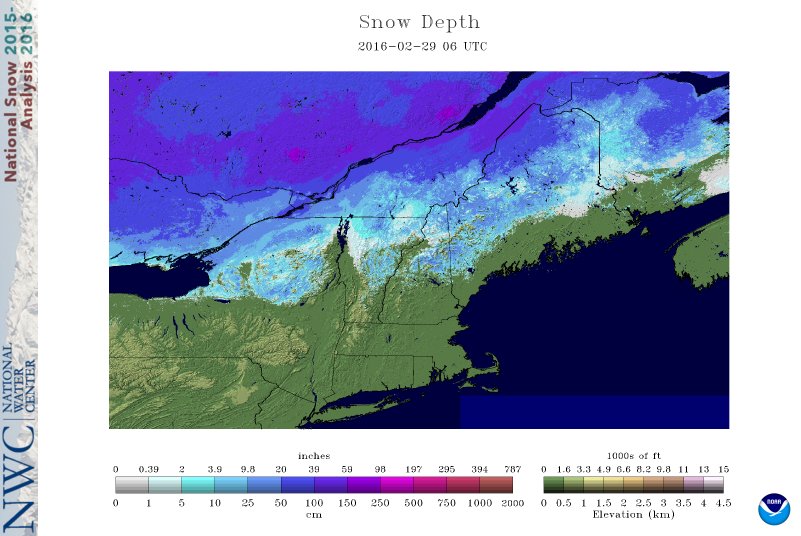
Northeast snow depth on Monday, February 29th. Snow-free in southern New England with not much covering the ground in northern New England, either. Source: NOHRSC
Where the snow drought is felt most strongly is across interior New England, which can be boom or bust during a strong El Nino. We talked back and forth about this in the weather center last fall. On the one hand, the storm track was expected to be aimed more toward the Mid-Atlantic area...with glancing blows to southern New England. But we thought maybe the storms would track close enough to the coast to at least bring some moisture into northern New England. What ended up happening is that the storms with available cold took that classic El Nino track, while the rest of the low pulled so far west that warm air was dragged up through New England. Worst case scenario.
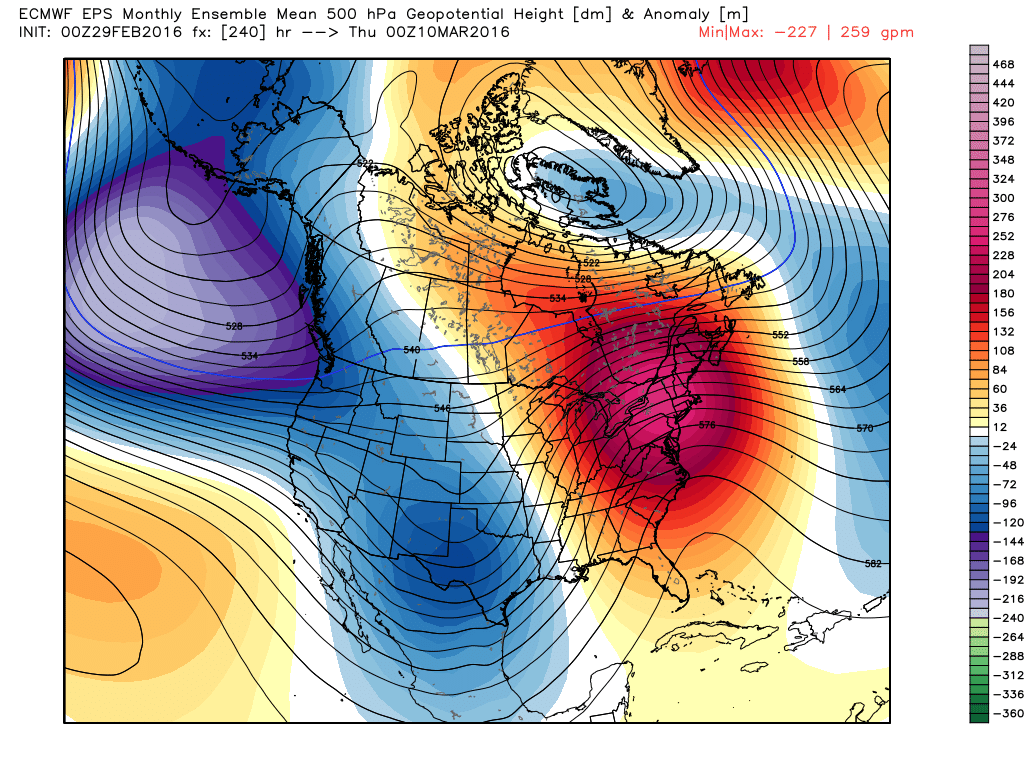
Latest long range ECMWF shows a significant pattern shift for the west and warmth for the east heading into Week 2 of March. Source: Weatherbell
To wrap it up, let's look forward!
What does March have in store for us? Another mild storm on Wednesday with 50s to start, but after that a pretty impressive cold shot Thursday through the weekend. That cold may be winters last gasp though, as all signals are pointing to a very warm March from the Midwest to the Northeast. A pattern conducive for western/southern storms and jet stream ridging in our part of the country looks likely, which means spring fever will likely be running high. If we don't get hit by a nearby winter storm on Friday, then we may very well be shutting down our snow chances for the season.
You can never say never, as we're not out of the woods until early April. But with climbing averages and more daylight, the feat will become tougher to pull off after mid-March. Of course, we'll keep you updated.



